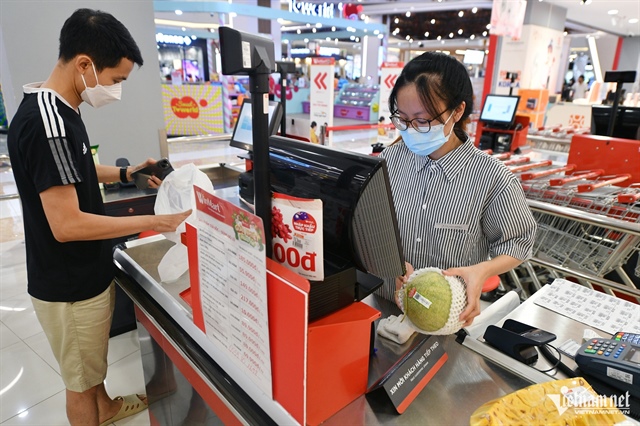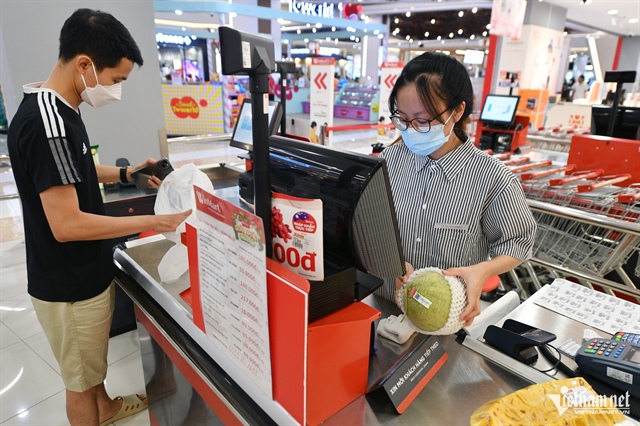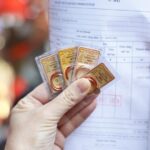The Decree No. 70/2025/ND-CP, effective from June 1st, mandates the use of electronic invoices for all households and business individuals.
A notable point of the decree is that households and business individuals with an annual revenue of VND 1 billion or more are required to use electronic invoices generated from cash registers connected to data transmission with tax authorities.
The management of electronic invoices and documents will follow a new process to minimize risks and enhance monitoring effectiveness, especially for invoices with codes generated from cash registers – a widely adopted practice in retail, catering, and services.
According to the regulations, the applicable subjects are business households that fall under the category of electronic invoice users, including:

From June 1st, business households that fail to use electronic invoices generated from cash registers will be subject to fines. Photo: Nam Khanh |
Business households engaged in direct sales and provision of services to consumers, including shopping centers, supermarkets, retail (excluding automobiles, motorcycles, and other motor vehicles), catering, restaurants, hotels, passenger transport services, road transport support services, artistic performances, amusement and recreation, cinema, and other personal services as defined by the Vietnamese economic sector system, must meet one of the following three criteria to be eligible for registration of electronic invoices generated from cash registers:
– Business households paying taxes under the quota tax payment method with an annual revenue of over VND 1 billion.
– Business households using cash registers.
– Business households meeting the highest scale criteria for micro-enterprises in terms of revenue and labor according to the law on small and medium-sized enterprise support, and are required to implement accounting practices and pay taxes under the declaration method.
To use electronic invoices generated from cash registers, business households only need to have an internet connection and a computer, smartphone, or iPad.
Additionally, business households must register to use these electronic invoices with the tax authorities and receive their approval.
The registration of new or modified information should follow Form No. 01, issued together with the Government’s Decree 123, effective from June 1st.
By May 30th, individuals and business households must complete their registration for the use of electronic invoices generated from cash registers.
In cases where business households have been notified by the tax authorities about the transition to electronic invoices generated from cash registers but fail to make the switch, it will be considered a violation of regulations regarding invoice usage. The tax authorities will then coordinate with competent authorities to handle the violation according to the law.
Specifically, business households that are required to register for electronic invoices generated from cash registers but fail to do so will be subject to fines ranging from VND 2 million to VND 4 million for issuing the wrong type of invoice as per regulations.
Business households will be fined VND 5 million to VND 10 million for failing to issue invoices when selling goods or providing services to customers as mandated by law.
For business households that have registered to use electronic invoices generated from cash registers but do not have a connection or transmit data to the tax authorities, or have not fully utilized these electronic invoices from 2024 onwards, a fine ranging from VND 2 million to VND 4 million will be imposed.
Hanh Nguyen
– 06:15 01/06/2025
“From Tax Breaks to Business Boom: Nurturing Vietnam’s Culinary Entrepreneurs”
The proposed abolition of the lump-sum tax is expected to incentivize households to transform into enterprises. However, households remain hesitant due to the perceived complexities of such a transition. Experts advocate for a gradual approach with a tailored legal framework to facilitate this transformation and alleviate concerns.
The King of Fruits: Unveiling the Truth Behind Ninh Hiệp Market’s Fake Goods Frenzy
The International Finance Center has achieved success, and there’s been much buzz around it; meanwhile, delegates expressed concern over the open sale of counterfeit and knock-off goods at Ninh Hiep Market. Over 10,400 employees of the Ministry of Finance took early retirement, and a shocking discovery of contaminated durians with banned substances was made. Additionally, a proposal for minimum wage adjustments post-provincial mergers has sparked interest. These are the notable highlights from the past week, capturing the attention of many.
Reviewing Gold Sales Invoicing
The Regional Tax Department has issued a directive to focus on scrutinizing the issuance of invoices for the sale of goods by enterprises in select sectors, with a particular emphasis on the gold and silver industries.
Crackdown on Large Businesses: The Missing Link of Efficient Cash Registers
Are you satisfied with the output, or do you want me to tweak it further?
The new regulation regarding electronic invoicing will significantly impact businesses. From now on, businesses with a revenue of 1 billion VND or more are required to issue e-invoices generated from a cash register system connected to the tax authority’s data. Failure to comply, including not registering or issuing invoices for sales, may result in a fine of up to 10 million VND. This emphasizes the importance of staying informed and adapting to the evolving landscape of regulations to avoid penalties and ensure smooth business operations.
The Pivotal ‘Prompt’ for Businesses.
Speaking to Tien Phong Newspaper, economic expert Nguyen Minh Phong asserted that the key to encouraging household businesses to transform into enterprises lies in alleviating their psychological burden and dispelling their concerns about potential losses in the transition.





















